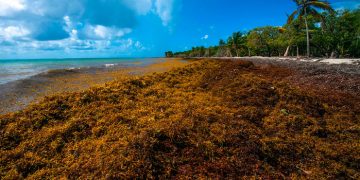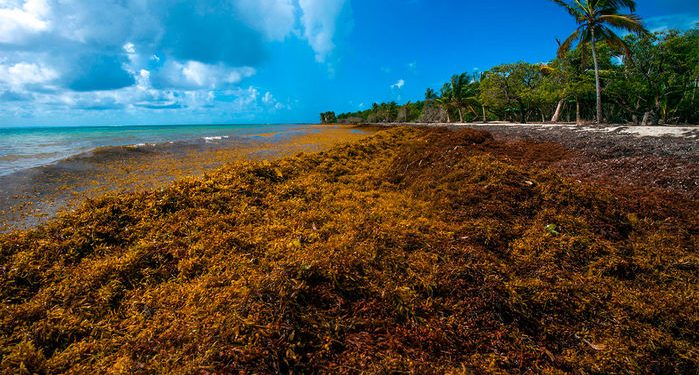COLE BAY – There is a large influx of Sargassum seaweed currently making landfall on Sint Maarten. The Nature Foundation is warning the community that the Sargassum impacts, based on satellite imagery and field surveys, started earlier this week and will continue to persist for at least another week: “We have been coordinating our monitoring efforts with our partners in the region and based on weather predictions, satellite imagery and field surveys large mats of Sargassum are impacting the area,” commented Nature Foundation Manager Tadzio Bervoets.
“We have been working closely with our partners in the region and with local stakeholders in monitoring the situation and to find a way to control the amount of the weed washing up on beaches in the case of a significant influx. In the case of an influx we need to find a way to coordinate the removal of the seaweed in order to avoid serious risks to nesting sea turtles and hatchlings while the algae itself can be a hazard to the animals,” continued Bervoets.
The Foundation is also warning residents of areas that are or will be impacted by the Sargassum to take precautions to avoid the negative health effects caused by the decomposing seaweed; “We are advising residents in especially Guana Bay and Point Blanche to keep windows and doors closed as much as possible,” commented Bervoets.
When the Sargassum lands and starts to decompose hydrogen sulfide gas is released. The gas is a colorless, toxic and highly flammable gas and spreads an unpleasant odor much like the smell of rotten eggs; “Inhaling the gas in small doses can trigger irritation of the eyes and the respiratory system, especially among people who are sensitive to it. The groups most at risk are people with respiratory problems, asthma patients, elderly people, babies and pregnant women. Certain animals, especially dogs, are also sensitive to the inhalation of hydrogen sulphide,” continued Bervoets
Sargassum is a genus of brown (class Phaeophyceae) seaweed which is distributed throughout the temperate and tropical oceans of the world. Sargassum first plagued St. Maarten in 2011 and 2012, with the Foundation having to warn swimmers to avoid swimming on certain beaches due to the large amount of Sargassum Weed and many beach front residences and hotels having to continuously clean washed up Sargassum.
The Nature Foundation will continue to monitor the situation and will coordinate with the public sector if and when the removal of Sargassum should occur..

















